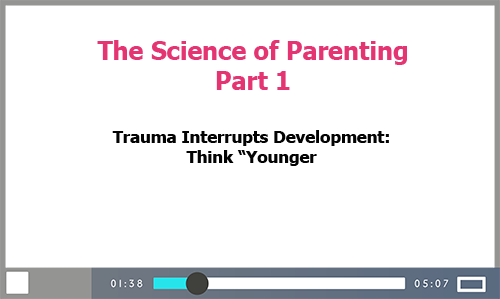
This presentation defines what is meant by trauma-informed parenting and then quickly moves on to show how trauma interrupts the processes of “normal” child development. The child who experienced trauma prior to arriving in the adoptive family presents with “immature” development. Parents must often “think younger” when parenting these sons and daughters. There is focus on the cognitive domain of development and its relationship to moral development, social skills, and problem-solving skills. Discussion concludes with concrete ways to help “grow up” the adoptee. Plenty of resources are provided for additional learning.
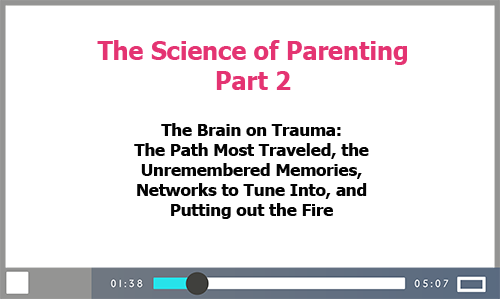
This presentation is two-parts. In this segment viewers are provided a thorough understanding of the stress-response system and how trauma creates an over-reactive stress response system. The son or daughter who arrives after trauma will have a hard time managing his or her emotions. Understanding the factors that underpin this situation lend to helping parents calm the way they respond to their child’s emotional dysregulation. The information provided includes cutting edge neuroscience. Plenty of resources for additional learning are provided.
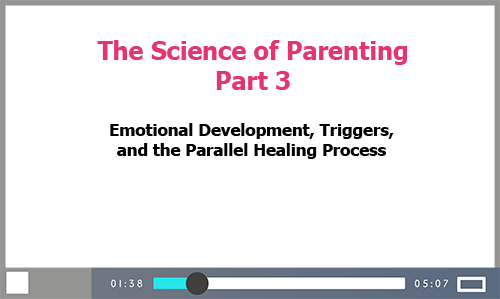
This discussion is the second segment pertaining to the emotional development of the adoptee who arrives after experiencing complex trauma. Viewers are provided an abundance of strategies to help the child attain emotional regulation. Adoptive families can have a peaceful home environment and lots more fun! We’ll also look at managing the triggers that result from early trauma and ways parents can help themselves improve their own state of mind. Resources are provided for additional learning.
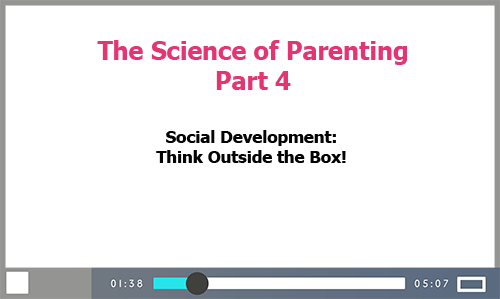
All parents want their kids to have friends, get invited to parties/play dates, and overall be involved in a healthy social life. Traumatized children often struggle in this area. Teens with early trauma histories of turn to unsafe/undesirable online means of quelling their loneliness. Discussed in this segment are ways to help the traumatized child learn to develop interests and have fun. We’ll also look at executive functions. Social skills, play skills and executive functions all develop through free play. One solution generates a wealth of skills necessary to succeed in the family, school, and the world. No matter your child’s age there are ways to help them become playful and social. Along the way, we can enhance executive functions which are essential for success. The presentation concludes with ample resources for additional learning.
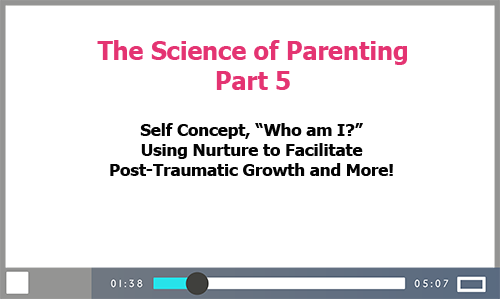
In this final segment we look at the ways trauma fractures the self-concept of the adoptee. Via traumatic experiences the child is left with thoughts about self and the world that are inaccurate. These cognitions impair the ability to form meaningful relationships. They also drive undesirable behaviors. We’ll also look at the brain areas responsible to facilitate self-concept and see that these have been left immature by trauma’s wrath. We’ll learn many ways to help the adopted child, tween or teen answer the question, “Who am I?” We’ll also learn ways to help kids develop a new way of thinking about themselves, the adults in their life and the larger community in which they live.
We’ll look at how nurture can rebuild all aspects of development. While it is not always easy to nurture kids who experienced trauma the gains it can offer are well worth the effort! Parents will leave this presentation with lots of short, simple ways to “cycle” their son or daughter to a healthier place! Final resources are provided parents leave this training program with books and websites for themselves, their sons and daughters, teachers, mental health professionals and even for their pediatrician.
We’ll look at how nurture can rebuild all aspects of development. While it is not always easy to nurture kids who experienced trauma the gains it can offer are well worth the effort! Parents will leave this presentation with lots of short, simple ways to “cycle” their son or daughter to a healthier place! Final resources are provided parents leave this training program with books and websites for themselves, their sons and daughters, teachers, mental health professionals and even for their pediatrician.